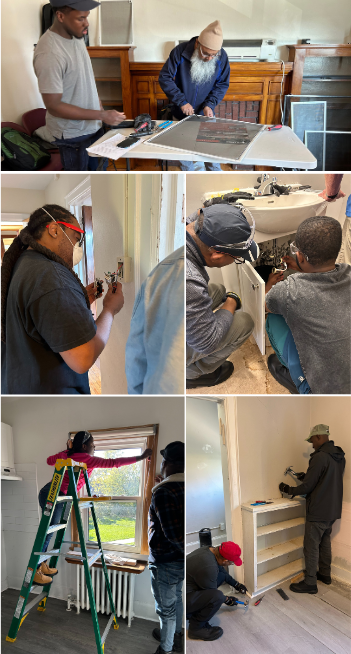The Building Maintenance Operator Training (BMOT) program covers a broad range of essential skills, combining theoretical knowledge with practical, hands-on training. Below is a breakdown of the key areas of focus:
1. Customer Service and Communication
- Customer Service Excellence: Develop skills to provide empathetic, patient, and professional service, ensuring tenant satisfaction.
- Effective Communication: Demonstrate clear and concise communication with tenants, managers, and staff, enhancing workplace efficiency.
- Conflict Resolution: Apply verbal de-escalation strategies to handle conflicts professionally.
- Collaboration: Work effectively with maintenance teams, trade contractors, and property management to achieve common goals.
- Task Organization: Prioritize and organize maintenance requests to ensure timely responses and smooth operations.
2. Safety Protocols and Compliance Standards
- Fire Safety and Emergency Procedures: Familiarize with fire prevention techniques, inspection routines, and emergency response protocols to ensure safety for all occupants.
- Safe Work Practices: Use personal protective equipment (PPE), follow WHMIS regulations, and adhere to incident reporting protocols for a safe work environment.
3. Preventative Maintenance
- Routine Inspections: Identify and address potential mechanical issues through regular system checks, reducing the likelihood of major repairs.
- Maintenance Scheduling: Create and implement maintenance schedules to minimize downtime and enhance operational efficiency.
- Documentation and Reporting: Maintain clear records of maintenance, inspections, and repairs for accountability and compliance.
- HVAC Maintenance: Locate, clean, and replace HVAC filters, ensuring optimal system performance.
- Accessibility Facilities: Inspect and maintain accessibility facilities like ramps, handrails, and door operators.
- Waste Disposal: Proper garbage removal and waste disposal according to regulations.
4. Digital Literacy and Technology Adaptation
- Maintenance Management Software: Utilize digital tools for managing work orders, scheduling, and reporting, improving overall workflow and productivity.
- Adaptability with New Technology: Stay flexible in adopting new technologies to enhance operational effectiveness and tenant satisfaction.
5. Plumbing
- Unclogging: Unclog toilets, bathtubs, and sinks using a plunger and snake.
- Fixing Leaks: Repair leaks in faucets or pipes utilizing pipe wrenches, adjustable wrenches, or pipe tape.
- Replacing Components: Replace worn-out parts such as faucets, valves, pipes, and P-Traps.
- Toilet Repairs: Repair or replace flush valves, fill valves, and other toilet components; install new toilets.
- Addressing Water Issues: Troubleshoot and resolve issues related to water temperature or pressure.
6. Electrical
- Replacing Bulbs: Safe replacement of light bulbs, fluorescent tubes, and light fixtures.
- Fixtures and Outlets: Skills in testing, resetting, and replacing switches and outlets, ensuring electrical safety.
- Basic Appliance Installation: Install or remove of basic electrical appliances like exhaust fans and window air conditioners.
- Safety Checks: Replace switch or outlet covers, and smoke, heat, or CO detectors using a ladder.
- Power Outage Response: Procedures for resetting equipment and breakers following a power outage.
7. Windows/Screens
- Inspection and Repair: Inspect windows and screens for damage, drafts, or leaks, and perform necessary repairs.
- Frame and Seal Replacement: Skills in repairing or replacing damaged frames, sashes, or seals, and securing broken windows with plywood.
- Window Coverings: Install or repair of window coverings such as blinds, curtains, or shades.
8. Carpentry
- Door Installation: Install door frames, hanging doors, and replacing locks, hinges, and latches.
- Drywall Repair: Skills in repairing damaged drywall, patching holes or cracks, and taping and mudding seams.
- Painting and Finishing: Repaint small areas of damaged wall paint and install or repair countertops and shelves.
- Cabinet and Closet Repairs: Repair or replace cabinet and closet doors and address minor flooring issues.
9. Exterior and Ground Maintenance
- Site Inspections: Conduct visual and physical inspections of exterior grounds to ensure safety and upkeep.
- Snow and Ice Removal: Implement snow and ice removal measures to maintain safe premises during winter.
- Landscaping and Maintenance: Skills in leaf and debris removal, graffiti management, and maintaining lawn and garden equipment.
10. Miscellaneous
- Unit Turnover: Inspect and clean vacated units before occupancy to ensure readiness for new tenants.
- Workshop and Storage Maintenance: Keep workshops, inventory rooms, and storage areas clean and organized.
- Pest Control: Inspect and manage pest-related issues, such as bedbugs, to maintain tenant comfort and safety.
